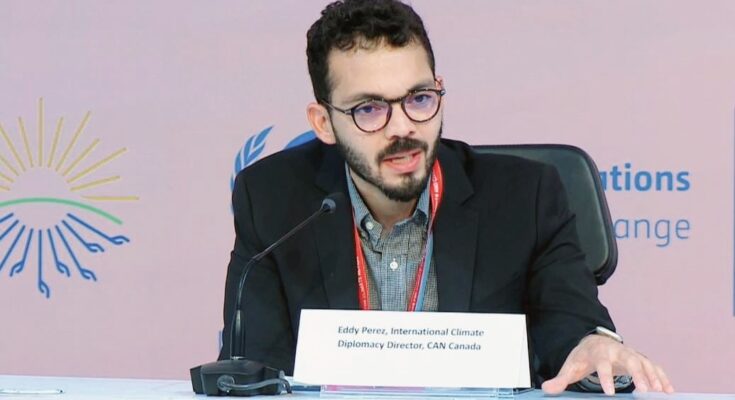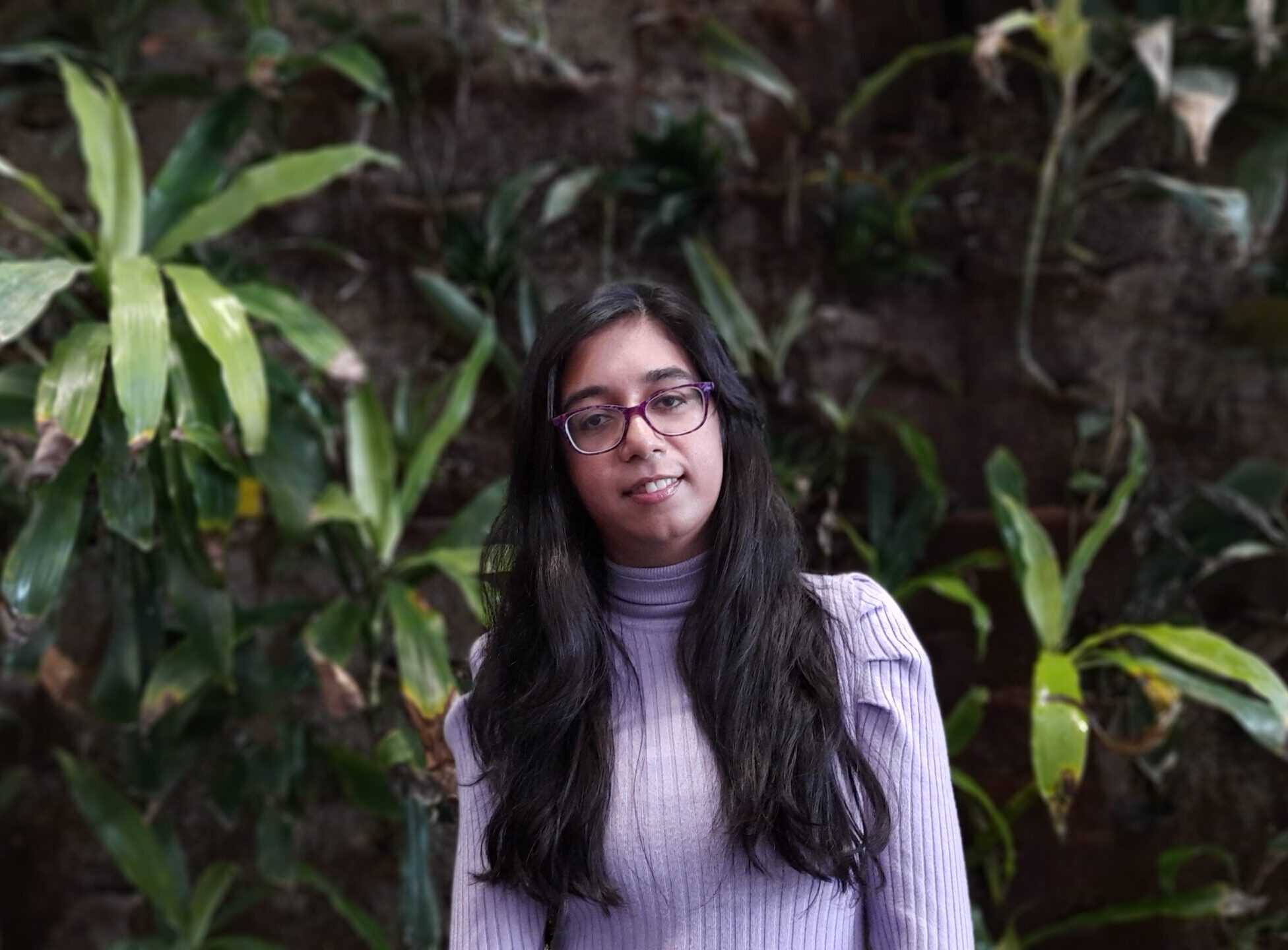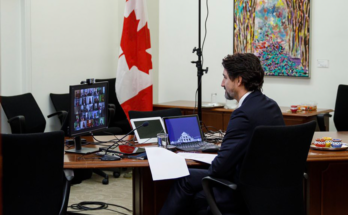By: Yumna Iftikhar
Eddy Pérez says he was relieved and there was a “lot of clapping” in the room when countries finally reached an agreement in Egypt last month to create a “loss and damage fund.”
The fund, agreed to by countries at the United Nations climate conference COP27, aims to provide assistance to developing countries that are most vulnerable to the effects of climate change. These effects include – but are not limited to – floods, droughts, crop fires, prolonged heat waves, species extinction and rising sea levels.
Pérez lives in Montreal and is the director of international diplomacy at Climate Action Network Canada. At the meetings in Sharm el-Sheikh, he says his responsibility was to represent civil society, engage with journalists, organize speeches, meet with countries to discuss different options and lead other advocacy efforts.
This was his sixth journey to COP. “There was a sense that something new was happening in that room and that we are about to adopt something more meaningful.”
The agreement to create a “loss and damage fund” at the United Nations climate conference has been dubbed a “breakthrough,” but not without some skepticism about the lack of details.
While Pérez noted this is an historic international decision, other experts and activists are asking how the fund is going to work and whether Canada can take a leadership role in the climate change talks.
Mitchell Beer is a publisher and managing editor of the Energy Mix, a climate change news site. He says he has mixed feelings about the results of the convention. Beer describes the decision as a “stunning victory wrapped in a disaster.”
“It was a really hugely important moment, a huge milestone. There were so many pieces on the COP agenda that only advanced incrementally,” he says.
Beer says he is happy an agreement was reached on the loss and damage fund but he’s disappointed other important climate issues were missing, like keeping emissions low.
The objective of a “loss and damage fund” is for rich countries to provide compensation for losses and damages faced by developing countries due to climate change.
According to an October report, in 2020, G20 countries – those with the largest economies in the world – emitted over 75 per cent of greenhouse gases. Developing countries – whose economies are smaller and whose carbon emissions are lower – are experiencing the devastating consequences of climate change.
Earlier this year, flooding in Pakistan resulted in a third of the country being submerged in water. Pakistan contributes less than one per cent of emissions.
Tamara Krawchenko, an assistant professor in public administration at the University of Victoria, says the concept of a loss and damage fund has been discussed before.
“There have been absolute decades upon decades of calls from both lower income countries that have been disproportionately impacted by climate change but also from researchers, ethicists,” she says.

While the agreement to create this fund has been referred to as a “breakthrough” by the United Nations, there is a lot to be decided. Governments agreed to set up a “transitional committee” to nail down the details before COP meets again in 2023.
Beer says there is a risk of countries backsliding on their promises between now and then. “It took them two weeks of negotiating and months of arm twisting before that to agree to [the fund].”
Ian Burton, a geography and environmental studies professor at the University of Toronto, says negotiations will be slowed down by questions about which countries will be providing funding and which countries will receive funding.
“Which country, as in how much and how to measure that, are all difficult questions to answer and there will be wide disagreements amongst the parties of the convention,” he says.
Canada’s role
Beer says Canada will have to answer another important question: where will Canada’s portion of the fund come from?
Although there is still no information on how much Canada is going to put into the fund and where the funding will come from, Krawchenko says Canada has played an important role in these talks.
“Canada has shown some leadership on how we are going to tackle this issue and that’s a very positive thing,” she says.
Pérez also says that Canada has played a progressive role. “They moved before other developed countries and they were able to show support for the kind of discussions that we needed to have when it comes to loss and damage.”
Pérez adds that it is a welcome shift that even when Canada is a major polluter and has a history of blocking negotiations about tackling the causes of climate change, the country was able to step up and say, “We need to talk about the consequences of the actions that Canada has provoked in the atmosphere.”
Now, Pérez says Canada needs to continue being a “champion” for the discussions that will take place within the next year.
Burton says he wants to see Canada “take a lead in the negotiations to help implement and specify how this fund is to be supported and managed.”
Why should Canadians care?
Beer says helping developing countries is an ethical imperative.
“Sitting in a wealthy country in a wealthy part of the world … there are parts of the world that are systematically suffering so deeply, and at a practical level we have to do everything that we can about this crisis to get as close as possible to leaving no one behind,” he says.
Beer also mentions that some developing countries are spending more of their budgets on climate adaptation than healthcare.
An article in the Guardian states that some African countries are spending up to 22 per cent of their GDP on climate adaptation.
“There are situations right now where countries on the frontline are having to take enough money out of their day-to-day budget to deal with the immediate impact of year-to-year climate disasters,” Beer says.
“A lot of money is flowing out of what budget they have for healthcare and education to go into climate adaptation and infrastructure.”
Pérez says that Canadians are also experiencing effects of climate change and can understand the importance of helping others.
“We are coming from a country that has a huge amount of privilege,” he says. “Because we are facing the impact of climate crises, I think we can understand that our contribution to helping people and communities all over the world can make a huge impact on those who are looking for hopeful and meaningful solutions.”
Pérez says he sees a lot of potential for what the loss and damage fund can do.
“It needs to create a story where we hold polluters accountable for the climate harm they have caused and they continue to cause,” he says.
“This fund produces and encourages a sense of hope that we can deliver for those most vulnerable, those most impacted by the climate crisis, and [those who] are fighting the biggest impacts of this climate inequality.”
.




